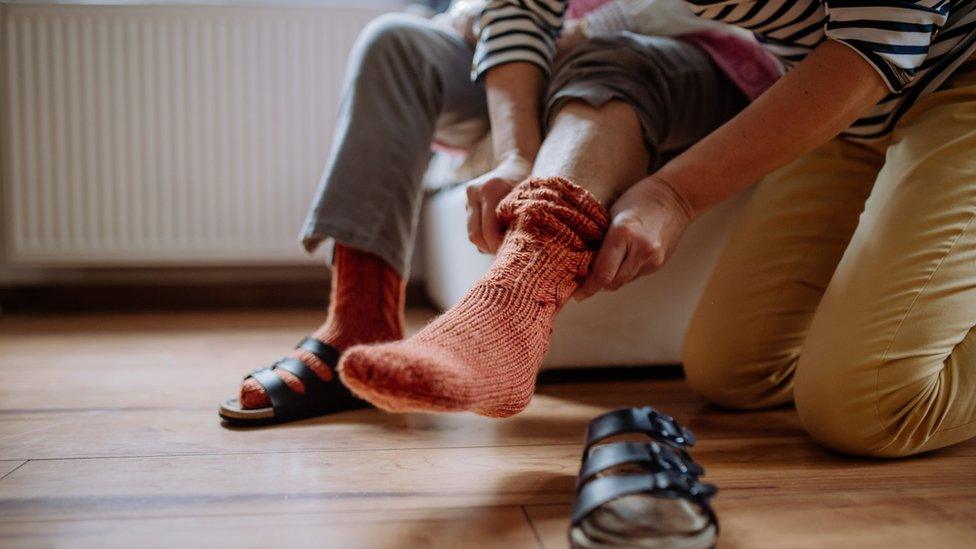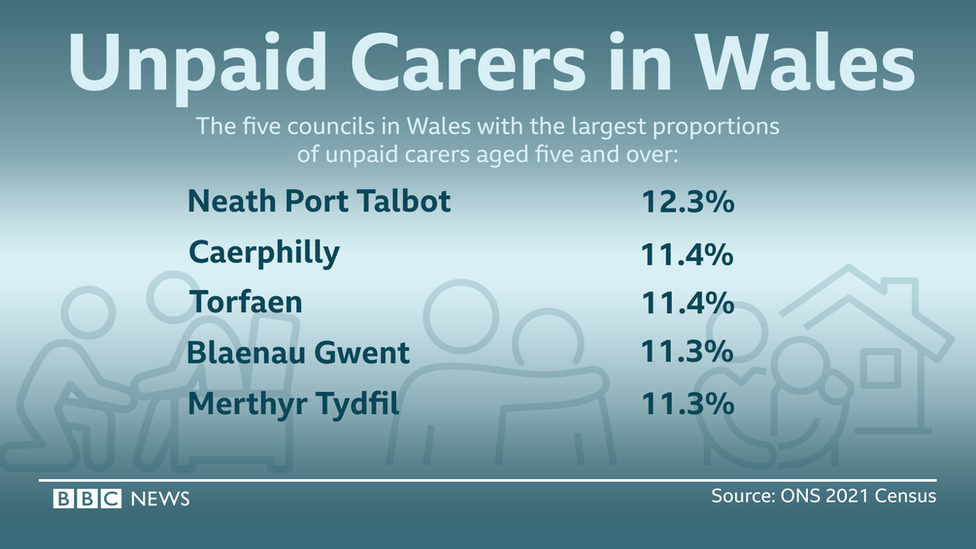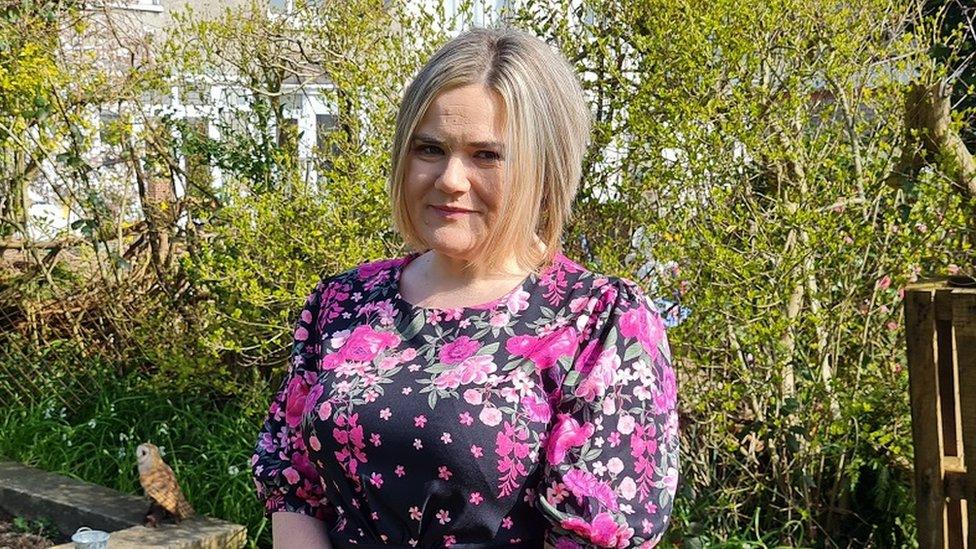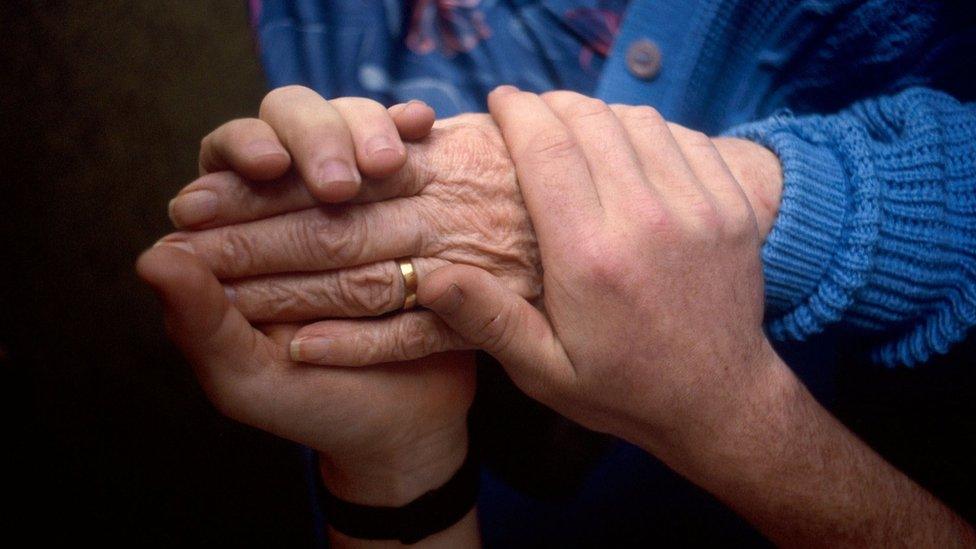Census: Fewer unpaid carers than 10 years ago
- Published

Jayne says after caring for her brother Tommy she has little time for her own needs
Jayne Newman said there was "no choice" when it came to caring for her brother, Tommy.
She is one of 310,751 unpaid carers in Wales, having cared for Tommy full-time for around 20 years in the belief he "would not have survived" care elsewhere.
Data shows there are fewer unpaid carers in Wales than 10 years ago.
But the most recent Census in 2021 found the remaining carers were providing more hours of care.
Tommy Newman has needed full-time care since he was starved of oxygen at birth.
His needs include help with getting around, medication, and is on a liquid diet.
"You don't get much life," said Jayne, who lives in Newport and has been a full-time unpaid carer to Tommy for about 20 years.
"I'm up at 03:45, six or seven days a week and I'm on call 24/7. If a carer can't come in I have to drop everything."

Jayne Newman says she is on call 24/7 caring for her brother
Jayne receives support from paid carers for 48 hours a week, paid for by social services, but she provides more than 100 hours a week caring for Tommy alone.
She employs carers using direct payments from the council. It means she also has to spend time on things like recruiting and working out holiday pay.
'Fighting for more support'
"It doesn't matter if you're out, you constantly check your phone to check nothing has gone wrong. You don't turn off for a second, everything runs through you."
She said that she is exhausted and needs more help.
"How do I cope? I cry. Some days I lie in bed and I think I can't keep doing this. But then I kick myself up the bum and keep fighting for more support," Jayne said.
"The main problem is they need to listen more to unpaid carers."

There are fewer unpaid carers in Wales than ten years ago and they are doing more hours of work
"We know our loved ones more than anyone. We only want the best."
There has been an increase in the number of hours that unpaid carers spend caring, according to the Census in 2021, external.
In Wales, 107,000 people provided 50 or more hours of unpaid care a week - as Jayne does.
In Wales and England, those who provided 20-49 hours of unpaid care increased from 775,000 in 2011 to one million in 2021.
But those providing 19 hours or less of unpaid care decreased from 7.2% in 2011 to 4.4% in 2021.

There was a larger proportion of people in Wales providing unpaid care (10.5%) compared to England.
'Propping up health and social care'
Jake Smith, policy director of the charity Carers Wales, said the figures showed more carers are providing "really high intensity" care.
"People who are carers in Wales are really having to put their lives on hold to look after their loved ones," he said.
"They see their physical and mental health decline and their ability to work and earn an income is massively diminished.
Mr Smith said unpaid carers were "propping up the health and social care system in Wales".
"They save Wales billions of pounds every year and have a really important role in keeping their loved ones out of hospital," he said. "If they aren't able to manage and they're exhausted and not able to provide the care then it's more likely that people are going to be readmitted into hospital."

Census 2021 director Jon Wroth-Smith warned the decrease in unpaid carers could be because of lockdown measures. People who previously shared caring responsibilities with a sibling, for example, would have had to care alone because of restrictions on household mixing.
"This could be why, while the number of unpaid carers has declined, we have seen an increase in the proportion of people providing more hours of care as individuals took on more responsibility," he said.
"However, this is just one possible explanation. Another could be the high numbers of deaths due to Covid-19 in 2020 and early 2021. Sadly, this could have led to a reduction in the need for unpaid care."
He said the wording of the question had changed between 2011 and 2021 and may have also had an impact on results.
A Welsh government spokesperson said it was working with partners to help more carers understand how to access advice and support, including their right to a carer's needs assessment.
The spokesperson said: "We have listened to unpaid carers' calls for help with respite and are investing £9m into a new short breaks scheme. Our £4.5m carers support fund has also helped thousands of carers access financial support and services."

THE LEARNERS: It's a new term in the beginners' Welsh language class
A SPECIAL SCHOOL: Behind the scenes at a school like no other

- Published17 May 2022

- Published23 March 2022

- Published18 November 2022

- Published24 November 2022

- Published13 June 2018
